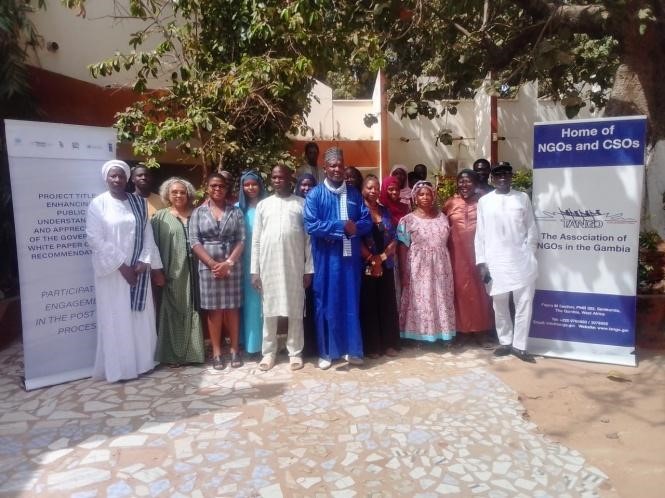By Amadou Manjang
Officials of the Association of Non-Governmental Associations on Friday met the post-Truth Reconciliation and Reparations Commission (TRRC) Unit to discuss the changing of the aid landscape, and how these shifts may affect prosecution in relation to the TRRC’s findings.
Speaking at the opening ceremony of their meeting, Ndey Sireng Bakurin, the Executive Director of TANGO said the meeting is a manifestation of their ‘shared commitment to justice, truth and national healing, and it reflects the growing urgency to ensure that transitional justice remains a national priority, and even to aid changing global realities.’ She said the TRRC laid the foundation for justice, but its recommendations alone cannot bring about change. She argued that there is a need for the implementation of the recommendation and that its implementation demands political will, sustained civic engagement and resources.
She said the discussion is timely and essential in sustaining the momentum for prosecution and reparation in the face of dwindling external support.
‘‘At TANGO, we believe the answer lies in collaboration, innovation and a renewed sense of national responsibility,’’ She said, adding that transitional justice should be seen as a sovereign obligation and a foundational element of the development agenda.
‘‘This means exploring domestic financing options, integrating justice goals into national budgets, and leveraging local partnerships, including the private sector and the diaspora,’’ she said.
She called on Civil Society Organisations (CSOs) to play the role of advocates, monitors, conveners and educators.
On her part, the Chairperson of TANGO, Mrs. Yadicon Njie Eribo, said the country is at a crossroads amid the evolving nature of the international environment for the implementation of transitional justice. She said the challenges that the country faces are not only about securing financial support but safeguarding political commitment and sustaining public trust.
‘‘The shifting dynamics of aid must not be allowed to derail or delay our commitment to justice. Instead, this moment calls for a deliberate, inclusive and nationally driven strategy that puts victims and affected communities at the heart of decision-making.
“Transitional justice should not be viewed as a donor-dependent project, but rather, it should be understood as a sovereign obligation rooted in the collective moral and constitutional duty to right the wrongs of the past,” she noted.
‘‘We must recognise that resource scarcity often fuels compromise, and we must guard against the temptation to pursue half-measures that may undermine the credibility and legitimacy of the process,’’ she said.
She also stated that engaging in the domestic sources of funding is an opportunity to re-imagine strategies on the implementation of the TRRC recommendations.
Meanwhile, she called on CSOs to remain bold, vigilant and uncompromising in the pursuit of accountability.


















